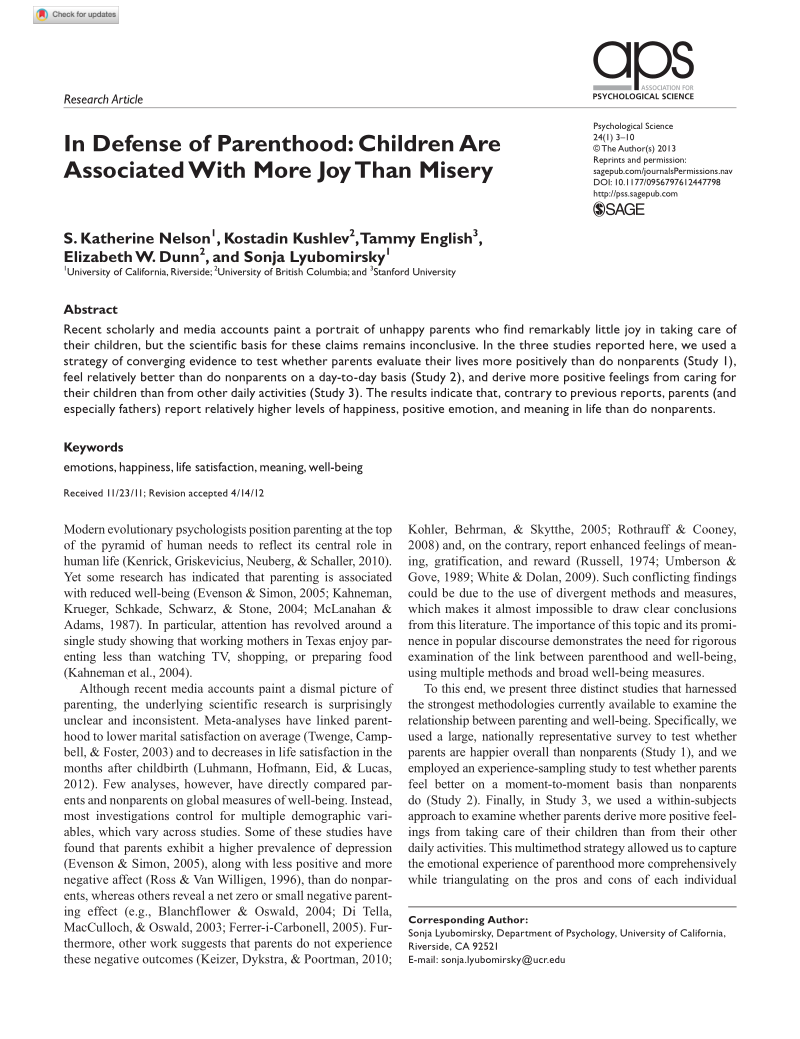Psychological Science study finds that parents have higher levels of happiness and meaning than non-parents.
- Type
- Academic / Technical Report
- Source
- S. Katherine Nelson Non-LDS
- Hearsay
- Direct
- Reference
S. Katherine Nelson, Kostadin Kushlev, Tammy English, Elizabeth W. Dunn, Sonja Lyubomirsky, "In Defense of Parenthood: Children Are Associated With More Joy Than Misery," Psychological Science 24, no. 1 (2013): 3-4, 8-9
- Scribe/Publisher
- Psychological Science
- People
- Sonja Lyubomirsky, Elizabeth W. Dunn, S. Katherine Nelson, Tammy English, Kostadin Kushlev
- Audience
- Reading Public
- Transcription
. . . .we present three distinct studies that harnessed the strongest methodologies currently available to examine the relationship between parenting and well-being. Specifically, we used a large, nationally representative survey to test whether parents are happier overall than nonparents (Study 1), and we employed an experience-sampling study to test whether parents feel better on a moment-to-moment basis than nonparents do (Study 2). Finally, in Study 3, we used a within-subjects approach to examine whether parents derive more positive feelings from taking care of their children than from their other daily activities. This multimethod strategy allowed us to capture the emotional experience of parenthood more comprehensively while triangulating on the pros and cons of each individual methodology, thereby bolstering the reliability of our conclusions. Across methods, we sought converging evidence for the hypothesis that children are associated with happiness and meaning rather than with misery.
. . . . Although the methods in each of our three studies had clear limitations, the consistency of findings across these studies provides strong evidence challenging the widely held perception that children are a source of reduced well-being. To the contrary, parents as a group reported being happier and more satisfied, and thinking more frequently about meaning in life than did their counterparts without children, although this overall pattern was qualified by several demographic moderators (Study 1). Furthermore, compared with nonparents, parents reported relatively more positive emotion and more meaningfulness on a moment-to-moment basis (Study 2). Finally, parents experienced levels of positive emotion and meaning during child care that significantly exceeded their own daily average (Study 3). Notably, across all three studies, all parents reported higher levels of meaning than did nonparents. In short, our results dovetail with emerging evolutionary perspectives that depict parenting as a fundamental human need (Kenrick et al., 2010).
. . . . Although it is impossible to randomly assign people to become parents, thereby precluding strong causal inferences, we believe that the present findings may be revealing to the general public, especially for those planning a family. Contrary to repeated scholarly and media pronouncements, people may find solace that child care may actually be linked to feelings of happiness and meaning in life.
- Citations in Mormonr Qnas
The B. H. Roberts Foundation is not owned by, operated by, or affiliated with the Church of Jesus Christ of Latter-day Saints.

